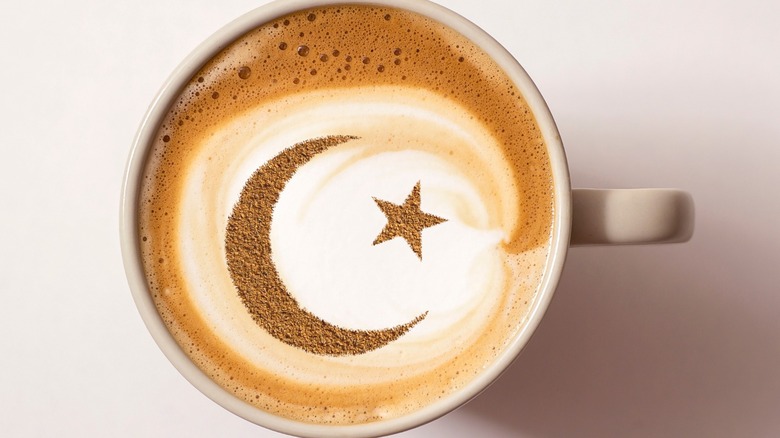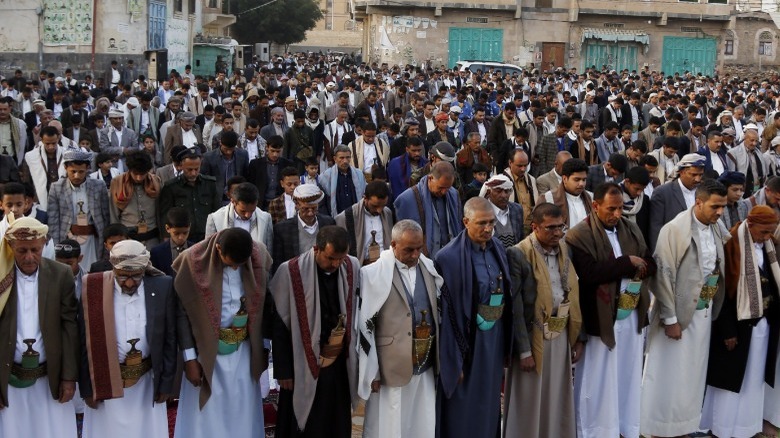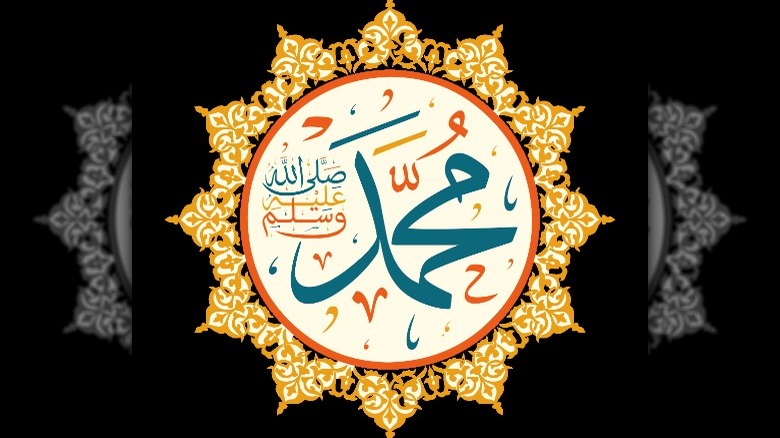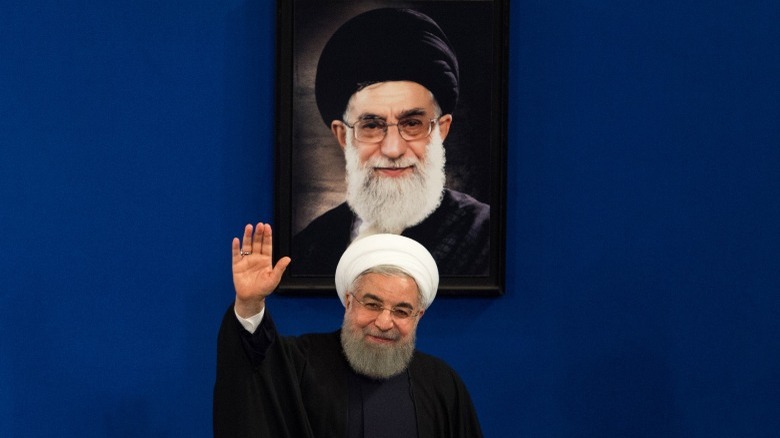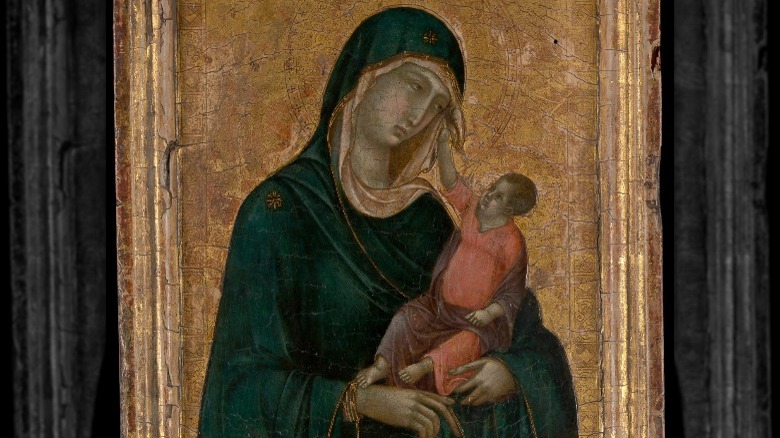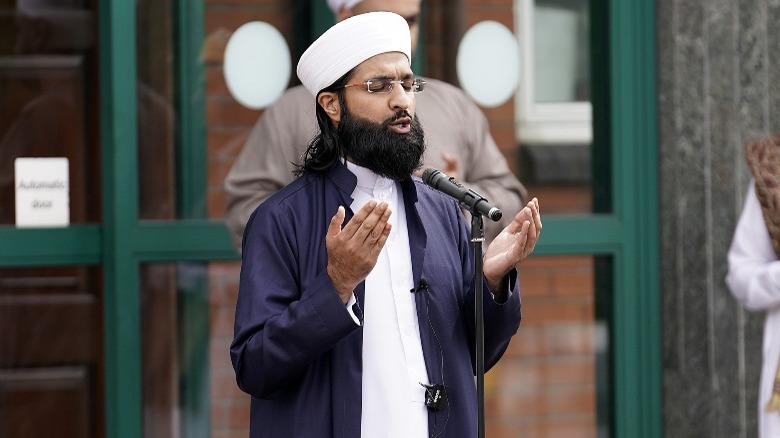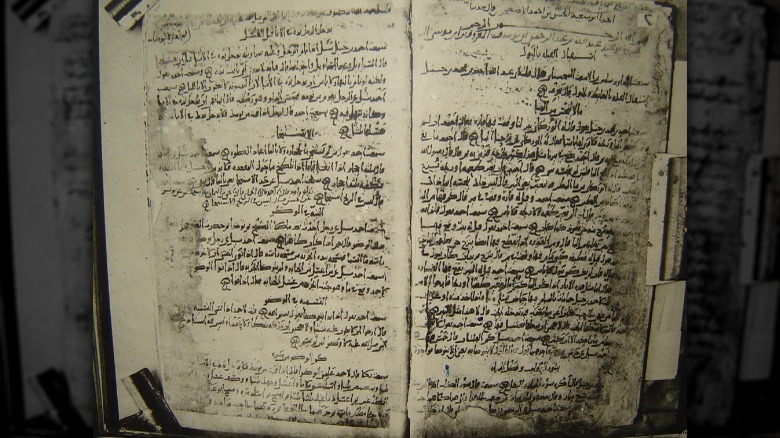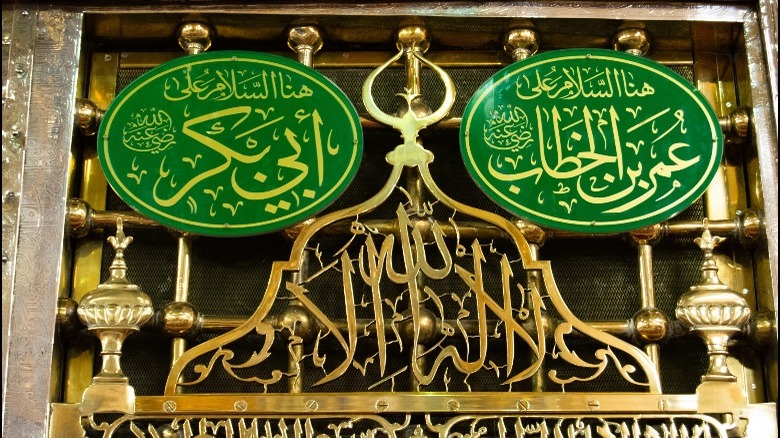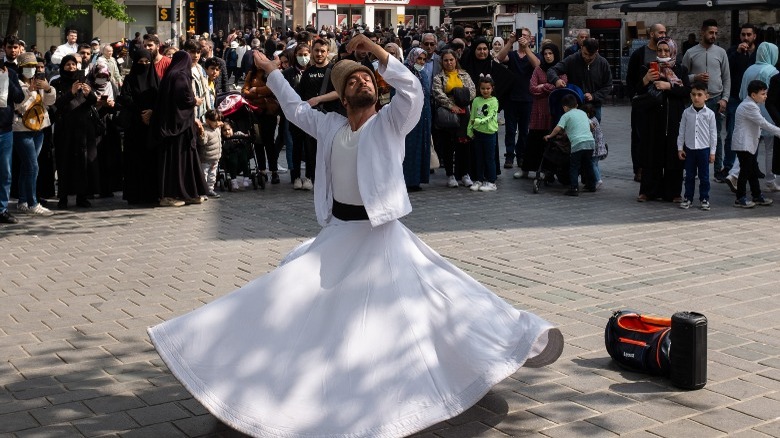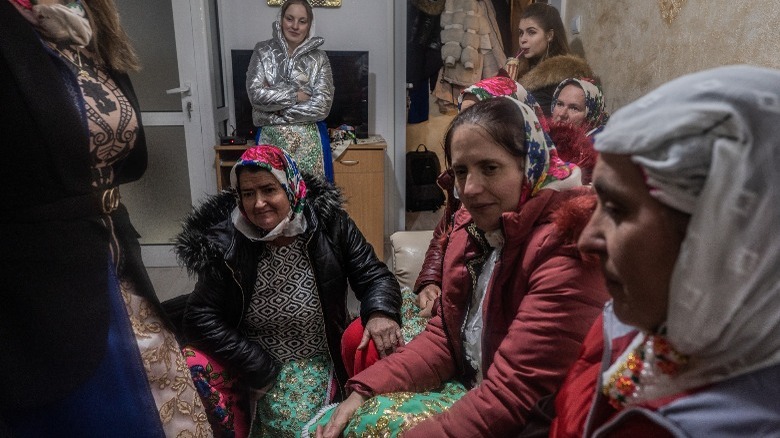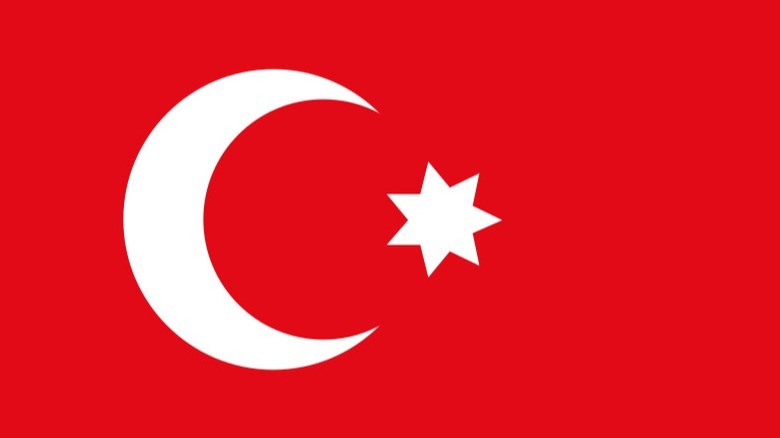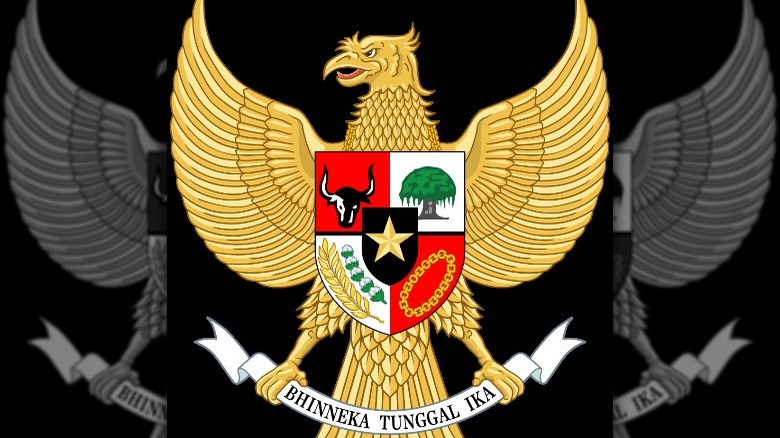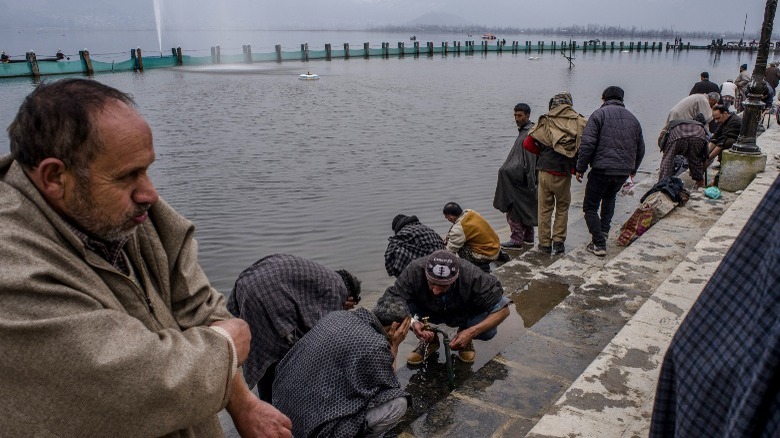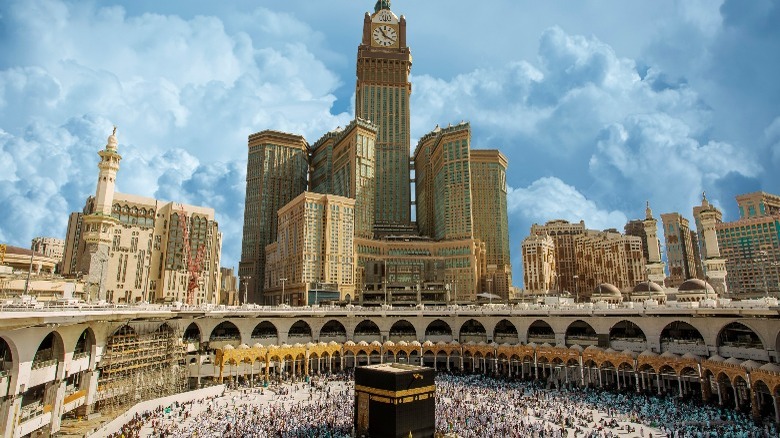The Untold Truth Of Islam
Islam is one of the biggest religions in the world today. According to the Pew Research Center, there are nearly 1.8 billion followers of Islam around the world (as of 2015), which makes it the second largest religion in the world behind Christianity. Islam has often had a contentious relationship with western cultures and religions, which has routinely led to violent encounters. In an interview with PBS Frontline, Islamic scholar Chandra Muzaffar argues that Islam was the first non-western religion to conquer a significant portion of Europe, which brought about Christian reprisals in the form of the infamous Crusades. As detailed by Britannica, the Crusades ended in defeat for the Christians after centuries of fighting, which Muzaffar argues impacted "the psyche of western civilization."
However, the relationship between Islam and non-Muslims has not always been antagonistic and combative. As Muzaffar describes, the world owes a great deal of credit to Islam regarding science, especially in the evolution of science and the scientific method. Surprisingly, even though Islam and other non-Muslim societies have coexisted for over a millennium, there is still a lot that non-Muslims — particularly in the western hemisphere — do not know about Islam. Much about the role of Jesus in Islam, the concept of an Islamic clergy, and Islamic law is either misunderstood or completely unknown by many people. Hoping to help close that gap, this is the untold truth of Islam.
Islam is based on five Pillars or obligations
While most non-Muslim people might know a little about Islam — such its holy book, the Quran — there are a number of lesser-known core beliefs that Muslims follow on a daily basis. According to The Metropolitan Museum of Art, the foundation of Islam is based on the Five Pillars of Islam. They are the profession of faith, prayer, alms, fasting, and pilgrimage. The profession of faith is the belief that "There is no god but God, and Muhammad is the Messenger of God," and sincere followers are obliged to say this phrase to become Muslim. Prayer refers to the requirement that Muslims pray five times per day, facing in the direction of Mecca, Saudi Arabia.
Per PBS, alms are "obligatory charity" collected in Mosques and given to impoverished and indigent Muslims — similar to such practices in Christianity and Judaism. Many are familiar with the annual fast by Muslims, which holds great historical significance. This month-long fast is called Ramadan, and comes from the Islamic rather than Gregorian calendar. Muslims — who are old enough and physically able — fast daily during Ramadan to honor and remember Muhammad's revelation of the Quran – which happened during that particular month.
The final pillar is known as pilgrimage, and it refers to the obligation of all Muslims to visit the holy city of Mecca, at least once during their lifetime — if they are able to do so.
Muhammad did not create Islam until he was 40 years old
The Prophet of Islam, Muhammad, is and has always been the centerpiece of Islam, and is beloved by all Muslims, no matter their sect or denomination. The exact date and year of his birth is not known, but he is believed to have been born in 570 A.D., in the Saudi Arabian city of Mecca (per William Cleveland in "A History of the Modern Middle East"). When he was a young man, he married Khadija, a wealthy Meccan widow, before becoming a merchant and respected community member.
However, when he was about 40 years old, Muhammad started to take solo trips into the mountains surrounding the city, to meditate in peace. During one of his meditations, referred to by Muslims as The Night of Power, Muhammad "was summoned to his prophetic mission," according to Cleveland. He was given a series of divine revelations from Allah (God), through Allah's angel Gabriel. For the rest of his life, Muhammad spent his time in the Saudi Arabian cities of Mecca and Medina, nurturing and growing Islam, until his death in 632 A.D. Upon Muhammad's death, his followers organized his words and revelations into a single book, known as the Quran.
The Sunni and Shia split is nearly 1,500 years old
As with other major religions, followers of Islam are divided into many different sects and denominations, and the largest two denominations in Islam are known as Sunni and Shia. Today, their differences mainly center around political control of countries with large Islamic communities, like Iran and Saudi Arabia.
However, their initial split goes back to the very beginning of Islam, nearly 1,500 years ago (per William Cleveland in "A History of the Modern Middle East"). Upon his death in 632 A.D., Muhammad had no known children and had given no instructions for who was to become his successor as the leader of Islam. This left the question open to interpretation, and thus laid the groundwork for bitter disputes.
Sunni Muslims respect Muhammad's successors, known as the Rashidun (rightly guided) caliphs, who took over following his death. However, Shia Muslims only acknowledge one of the Rashidun caliphs as legitimate — Muhammad's cousin and son-in-law, Ali. After he had gotten into a civil war with another of Muhammad's followers, Mu'awiyah, Ali was murdered in 661 A.D. Ali's surviving followers viewed Mu'awiyah as an illegitimate usurper, and they pushed Ali's son Husayn to fight against his father's killers, but Husayn too died in battle against Mu'awiyah. Shia Muslims see the death of Husayn as a fundamental moment in their evolution, and they view Ali and Husayn as martyrs who died protesting Sunni hegemony — which many Shia still view as a struggle today.
Jesus is highly revered in Islam as a respected Prophet
According to CNN, one false myth about the Muslim faith — that has become especially prominent in recent decades — is the false idea that Islam does not recognize Jesus, or respect his teachings. In fact, this could not be further from the truth. Per Michigan's Muslim Unity Center, followers of Islam "love Jesus, honor him, and believe in him. In fact, no Muslim can be a Muslim unless he or she believes in Prophet Jesus." In the Quran, he is referred to as a "servant" of God, rather than the "son" of God, with the latter ascribed to translation errors in the Bible.
Jesus' mother Mary has an entire chapter devoted to her in the Quran, and Muslims believe in the story of the virgin birth (via Vox). In addition, Muslims believe that Jesus will return in the future, on Judgment Day, to defeat the Antichrist — as do Christians. So while Jesus' image might have slightly different interpretations between Islam and Christianity, there are also significant amounts of similarities.
Islam does not have a clergy like Christianity
One of the trademarks of Christianity is its extensive clergy. Islam, though, does not have a priesthood or organized clergy in the same way that Christianity does. Yet, while there is not a formal clergy in Islam, there is still a group of religious authorities, who are known as the ulema (per William Cleveland in "A History of the Modern Middle East"). Historically, legal experts, like lawyers and scholars, as well as teachers, judges, and prayer leaders, have all been considered part of the ulema. They were the ones who not only passed on the knowledge of the Quran and the Prophet Muhammad's teachings to younger generations, but also created the Islamic legal system known as Sharia.
To create a uniform and standardized education program for the ulema, in the 11th century, the Abbasid caliphate created madrassas — Islamic institutions of higher learning. These served to educate generations of new ulema, and eventually spread throughout the Islamic world.
The concept of Sharia is widely misunderstood in the West
Among non-Muslims, the concept of Sharia is probably one of the most misunderstood aspects of Islam. According to the Council on Foreign Relations, Sharia is "the ideal form of divine guidance that Muslims follow to live a righteous life." Sharia is based on a combination of the Quran, which is taken to be the direct word of God, and the Hadith — the sayings and practices of the Prophet Muhammad. Contrary to popular belief, Sharia is not the same as Islamic law, but rather Islamic laws are based on interpretations of Sharia. Islamic laws are also highly influenced by local customs and local analysis of Sharia.
However, according to the ACLU, many American's understanding of Sharia is based on misinformation and misperceptions. Enough people in the U.S. are wrongly under the impression that "Sharia law" is somehow taking over the American judicial system, that there have even been misguided efforts to introduce legislation to further buttress these fringe claims.
Per the University of Southern California, many people refer to Sharia negatively, and think it is synonymous with the idea that Islam is uncivilized and outdated. They also wrongly associate Sharia with barbaric practices such as honor killings, which have no actual basis in Sharia or Islamic law. In reality, Sharia is a moral compass for Muslims, and not intertwined with barbaric forms of punishment.
The Caliphate ended nearly a century ago
The term caliphate simply means an Islamic state and community, and the caliph is the community leader (per Britannica). It has a long history within Islam, dating back to the time of the first successors of Muhammad. During this period, Muslims organized themselves together as both a religion and a state, which became known as a caliphate.
After Muhammad died, the rule by his first four successors become known as the Rashidun Caliphate, which means rightly guided caliphate in Arabic, per "A History of the Modern Middle East." Following the Rashidun Caliphate was the Umayyad and Abbasid Caliphates, which lasted from 661 A.D. to 750 A.D., and 750 A.D. to 1248 A.D., respectively. It was during these caliphates that the Muslim community expanded incredibly rapidly, conquering large swathes of territory in Asia, North Africa, and Spain.
The last widely recognized caliphate was the Ottoman Empire, which ceased in 1924 as the empire disintegrated. According to an article in the Economist in 1924, by then the caliphate was seen as outdated and incompatible with the ideals of democracy and nationalism. Instead of a supreme Islamic leader, modern Turkey was to be led by an elected parliament, and focused on nationalist rather than religious goals.
The phenomenon of Islamic Sufism
One of the more intriguing aspects of Islam is the phenomenon of Sufism. As described in "A History of the Modern Middle East," Sufism is also known as "Islamic mysticism," and "embodies a rich variety of religious experiences." It originated in the ninth century, during the Umayyad and Abbasid caliphates, as an ascetic movement within Islam. Sufism, or Sufis as its followers are known, were rebelling against what they saw as the materialism and worldliness of the caliphs and their courts. Groups of Sufis would typically organize around a religious figure who claimed the ability to communicate with Allah, and they would utilize various dancing and breathing rituals to attain spiritual ecstasy and fulfillment. The "golden age" of Sufism lasted from its beginning until roughly the 13th century, but was a significant part of the fabric of Islamic society from the 12th century.
Even among the Muslim community, there is a lot of misunderstanding and confusion about Sufism (per The New York Times). Recently, Sufis have come under attack from hardliner and extremists Islamist sects, who view them as heretical and use this as justification for their persecution. Extremists have attacked Sufi mosques and places of worship throughout Africa and the Middle East, in an effort to destroy Sufism and establish a more fundamentalist type of view. Yet, the overwhelming view of modern Sufis is that of "love, peace, and tolerance," and they generally eschew the politicization of religion.
The Quran increased freedoms for women
Contrary to common opinion among non-Muslim western cultures, Islam does not wholeheartedly oppress women. As William Cleveland explains in "A History of the Modern Middle East," the status of women in pre-Islamic Arabia was in fact greatly inferior to men, and the Quran "set forth guidelines intended to improve their status in seventh-century Arabia." For example, the Quran ended the practice of women being sold into marriage, and gave them "the legal right to own material wealth." Women also gained limited divorce rights under the Quran, and they attained the right to inherit a portion of their loved one's estate upon their death — significantly increasing their ability to acquire wealth.
While many of the Quran's reforms emphasized a patriarchal hierarchy within Islamic society, they still improved the status of women by giving them some rights, in areas where they previously had none. There are also non-patriarchal interpretations of the Quran as well: per the Arab Center in Washington D.C., many interpretations of the Quran are based on patriarchal traditions and expectations, but if those assumptions are not taken into account a more equality-based understanding of the Quran can be achieved. It is important to understand the nuances, and context, in which such popular interpretations were created.
The Ottoman Empire lasted over 600 years and spanned three continents
While many people are familiar with the Ottoman Empire as the former ruler of Turkey, their breadth, longevity, and impact often come as a huge surprise. Most do not realize the empire was actually founded in the late 13th century, and lasted until a few years after the end of WWI (via The Ohio State University). At their peak they were the "largest political entity in Europe and western Asia," before they slowly declined over several centuries. The Ottoman Empire was also the longest-lasting continuous Islamic dynasty in history, per The Metropolitan Museum of Art, surpassing the 500-year-long Abbasid caliphate by over a century.
The Ottoman Empire was founded in the last decade of the 13th century, by Muslim warrior and chieftain Osman I, who rebelled against his rulers, the Seljuk Turks, and created his own caliphate (per The Ohio State University). The name Ottoman is derived from Osman, and they immediately started to expand their empire after defeating the Seljuks. They pushed outwards in all directions, from their initial center in Anatolia (Asia Minor).
In 1453, they conquered and took Constantinople from the Byzantine Empire — and renamed it Istanbul — in one of the most momentous events in modern world history (via History). Yet, as time progressed, the empire began to stagnate and failed to modernize. Their ill-fated alliance with Germany and the Central Powers in WWI ultimately led to their dissolution in 1924, after their disastrous defeat.
Indonesia has the largest population of Muslims in the world
While Islam has its origins in — and is still strongly associated with — the Middle East, the international Muslim community covers virtually the entirety of the globe. Per the Pew Research Center, there are just under 1.8 billion followers of Islam worldwide (as of 2015), which counts for nearly a quarter of the entire human population, and only about 20% reside in the Middle East. In fact, Indonesia has the world's largest population of Muslims, with over 215 million, and India has the second most with just shy of 195 million Muslims (As of 2015, via the Pew Research Center.) Indeed, just under half of the world's Muslim population live in Asia — mostly in India, Indonesia, Bangladesh, and Pakistan.
In terms of followers, Islam is currently the world's second largest religion, after Christianity. In 2017, however, the Pew Research Center predicted that, by the year 2100, Islam will overtake Christianity as the most popular religion in the world.
Muslims have to purify themselves before they can pray
Before Muslims can perform their prayer rituals to worship Muhammad and Allah, they have to go through a cleansing to prepare themselves first. This important act is called Wudu, and involves a very specific set of actions. According to a PBS interview with Imam Talib Shareef, Muslims "want to represent our best," and be as clean as possible before presenting themselves for prayer.
Wudu is a multi-step process, beginning with stating one's intention that they will make the ablution (washing oneself) to stand in obedience to Allah. Then, each hand is washed — right before left — three times to represent their spiritual, mental, and physical motivations. Next, the Muslim will wash — in this specific order — their mouth, nose, face, arms, hair, ears, and each foot, again going from right to left. After this, the Wudu ritual is considered complete, and a Muslim can consider themselves to be clean and ready to perform the profession of faith, and begin praying. Wudu is alluded to in the Quran, and is a necessary act for Muslims.
Mecca is considered a holy city and is closed to non-Muslims
The city of Mecca is commonly associated with Islam and Muslims, but many non-Muslims only have a vague understanding of why. According to James L. Esposito in "What Everyone Needs to Know About Islam," Mecca is considered the holiest place in the Islamic world because it was the birthplace of the Prophet Muhammad, and contains the Kaaba. The Kaaba is believed by Muslims to be the first house of worship that Allah created for humans, which Muhammad restored, cleansed, and reclaimed for Islam (having being previously adopted for "tribal gods and icons"), when he returned from exile. Located in Saudi Arabia, Mecca is also completely closed to non-Muslims.
Today, Mecca is the site of the hajj, or pilgrimage, which is one of the five pillars of Islam. The hajj involves Muslims, from around the world, traveling to Mecca to pay tribute to the Prophet Muhammad. Muslim pilgrims dress in mainly simple clothing, stressing purity over style, and chant "I am here, O Lord, I am here" when arriving. Once they enter Mecca, Muslims on the pilgrimage spend their time symbolically reliving past events from the history of Islam.
